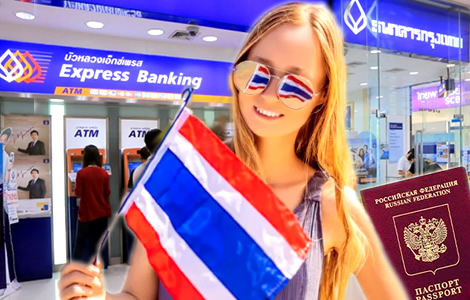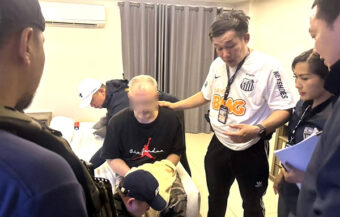Bangkok Bank is freezing accounts held by foreigners without long-term visas, triggering outrage from Russian tourists. The crackdown, linked to new SIM ID rules and scam prevention efforts, has left many visitors in Phuket and Pattaya facing financial chaos.
Russian tourists with bank accounts in Thailand are among a growing number of foreign visitors crying foul this week. The backlash comes as Bangkok Bank begins blocking and restricting accounts held by foreigners without long-term visas. The bank confirmed the move as part of enhanced security measures introduced earlier this year. As Thailand’s largest retail bank, it is acting in response to new government regulations rolled out in April. These rules require all personal bank accounts to be linked to a valid SIM or mobile number registered in the account holder’s name. The crackdown follows last week’s arrest of staff from another bank in Pattaya. They are accused of helping Chinese crime syndicates launder illicit funds through the country’s financial system.

Bangkok Bank has introduced tough new rules for foreigners opening accounts, igniting backlash in Thailand’s top tourist destinations. The move is part of a broader national effort to curb online fraud, money laundering, and abuse of Thailand’s visa system.
In particular, Russian nationals in Phuket have been vocal. Several have reported frozen accounts and blocked debit cards. While Bangkok Bank insists the move is about compliance, critics say it’s causing confusion and financial hardship for many long-stay visitors.
The policy change follows a series of coordinated actions from government agencies over recent months.
Thailand’s new SIM-linked banking regulation prompts mass account closures for non-residents and tourists
In April, the Digital Economy and Society Ministry enacted a new regulation by Royal Decree. The law demands all personal bank accounts be linked to a valid SIM card, registered to the account holder. Shortly afterwards, banks across Thailand began restricting or even closing accounts that failed to comply.
Now, Bangkok Bank—Thailand’s largest retail lender—has gone further. It has stopped allowing most foreign tourists to open accounts at its branches.
According to bank statements, the change applies to new accounts, credit card applications, and mobile banking services. Officials say the aim is to block so-called “mule” accounts used by scam syndicates to transfer stolen funds.
Although the bank insists it still serves long-term foreign residents, many casual visitors are now locked out. Importantly, only foreigners with long-term visas, property ownership, or Thai spouses can now open accounts.
Those on tourist visas, including Destination Thailand Visa (DTV) holders, no longer qualify.
Bangkok Bank confirms DTV holders are barred from accounts despite extended stay rights under new visa
Bangkok Bank said even DTV holders—allowed stays of up to 180 days—are still considered “tourists” under the rules.
“If a customer is classified as suspicious, identity verification is mandatory,” said a bank spokesperson. This may include biometric face scans, document checks, and interviews at local branches.
The restrictions follow a growing number of fraud cases tied to bank accounts opened with forged or misleading paperwork.
Last week, the crackdown intensified after police arrested four bank employees of a rival retail bank in Pattaya. The workers had helped Chinese nationals open accounts using fake documents. These mule accounts were then used to funnel money from scam victims.
According to Police General Thatchai Pitaneelaboot, the bank manager and three other staffers were detained in Bang Lamung district. They worked at a bank branch outlet on Pattaya Klang Road in Tambon Nong Prue.
Pattaya banking staff arrested for aiding Chinese nationals in creating mule accounts tied to a major scam
Investigators say the four helped 15 Chinese scammers open accounts on March 9. All of the Chinese suspects entered Thailand on tourist visas. They returned to China just six days later. Before leaving, they had opened 15 accounts and withdrawn ฿91 million out of ฿118 million deposited.
The scam syndicate allegedly ran 462 mule accounts across Thailand. Authorities say they defrauded over 2,000 victims. Total damages exceeded ฿2.2 billion.
Police have frozen the 15 accounts and are working with Chinese authorities to arrest the suspects. Two interpreters involved in the account opening were also arrested.
“This was a major scam operation,” said Gen Thatchai, who heads the Royal Thai Police Cyber Crime Investigation Centre.
Following the scandal, the Bank of Thailand ordered all commercial banks to review customer verification procedures.
“If identity checks fail central bank standards, banks must correct them immediately,” said assistant governor Daranee Saeju.
She confirmed new fraud management guidelines are being drafted. Under the new rules, banks must go beyond basic ID checks. For instance, customer names must be compared to the Anti-Money Laundering Office’s database of mule accounts.
Stricter bank rules introduced to block scams include fraud checks, facial ID and transaction limits
Banks must also evaluate risk levels and apply safeguards like transaction limits or reduced deposit caps. Importantly, accounts opened via facial recognition will face tighter controls.
Meanwhile, Russian nationals continue to report disruptions. According to the Bangkok Community Help Foundation, Bangkok Bank has started freezing accounts held by some Russian tourists.
The group warned that the measures may soon affect all nationalities who don’t meet the new criteria.
“If you don’t qualify, contact the bank immediately,” the foundation urged in a social media post.
Russia’s official news agency, TASS, quoted a Bangkok Bank spokesperson confirming the halt on tourist accounts.
“Since January, Bangkok Bank has operated under new rules,” said the spokesperson. “Foreign tourists can’t open accounts.”
Russian tourists report blocked Thai bank accounts as financial confusion spreads in tourist hotspots
Even long-stay tourists under the DTV scheme are excluded. When asked about reports of blocked accounts, the spokesperson added, “It doesn’t mean the account is closed.”
“In some cases, customers must visit the branch and complete identity verification. Sometimes that includes a face scan.”
Tourists have voiced anger and confusion online. Many say they weren’t warned their accounts might be frozen. Some rely on Thai bank accounts to pay rent, book travel, or receive overseas transfers.
Without those accounts, their daily lives become harder. Critics also note that tourist spending plays a vital role in Thailand’s economy, especially in Phuket and Pattaya. However, the government says rising financial scams require tough countermeasures.
In mid-April, an emergency decree took effect holding banks, telecom firms, and tech platforms liable for scam-related losses. The law obliges financial institutions to flag suspicious transactions and report suspected fraud immediately.
Emergency decree compels banks and tech firms to act fast on scams as public losses rise sharply
Digital Economy Minister Prasert Jantararuangtong said the decree aims to reduce the country’s rising digital crime rate. He stressed that the government must act now to protect the public.
“People are losing money through phone and online scams,” he said. “We must act together.”
The Ministry of Commerce and the Immigration Bureau have also launched a campaign targeting misuse of the Foreign Business Act. This includes crackdowns on nominee shareholding structures used to evade Thai ownership laws.
Authorities say abuses increased after the 90-day tourist visa policy was expanded in July 2024. Since then, many foreign nationals—especially from China, Eastern Europe, and Russia—have reportedly exploited the longer stay options.
Thai banks brace for more foreign account restrictions as regulators aim to clean up underground finance
Banking insiders say Bangkok Bank’s policy shift may be the first of many. Other major banks are expected to adopt similar measures in the coming weeks. Foreign residents are advised to check their visa status and contact their banks if they face issues.
In the meantime, Thailand is walking a tightrope. On one hand, it wants to remain open to tourists and investors. On the other, it is under pressure to clean up a shadowy financial underworld that has grown rapidly in recent years.
New foreign-owned business model in sex industry with a Burmese bank account and trafficked workers
Banking crisis addressed by the Finance Ministry as Puey research shows only 25% of Thais are bankable
Survey says that 10% of Thai bank accounts have 93% of funds with 19% having less than ฿500
With billions of baht in scam losses and international criminals abusing loopholes, Thai banks are being forced to draw a harder line. For now, the message is clear: only those with long-term ties to Thailand will enjoy full banking privileges.
Everyone else must be prepared for tougher scrutiny and possibly a trip to the bank to prove who they are.
Join the Thai News forum, follow Thai Examiner on Facebook here
Receive all our stories as they come out on Telegram here
Follow Thai Examiner here
Further reading:
New foreign-owned business model in sex industry with a Burmese bank account and trafficked workers
Immigration boss warns that a new crackdown on foreigners flouting Thai laws has begun


















